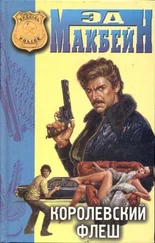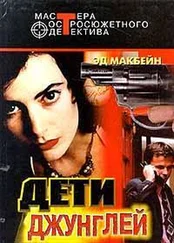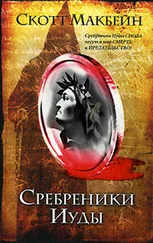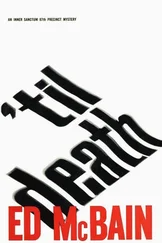Emma looked at the letter again. “ ‘The first thing I want to do is celebrate,’ ” she read. “ ‘There’s a new restaurant on top of the Freemont Building, and I’d like to go there Saturday night. Very elegant, very continental. No panties, Sally. I want you to look very elegant and demure, but no panties, okay? Like the time we ate at Mario’s down in the Quarter, do you remember? Then, when we get home...’ ” Emma shrugged. “Lovey-dovey stuff,” she said.
“Girl had more panties than a lingerie shop,” Brother Anthony said. “Whole drawerful of panties.”
“So he asks her not to wear any!” Emma said, and shook her head.
“I’m gonna buy you one of those little things ballet dancers wear,” Brother Anthony said.
“Thank you, sir,” Emma said, and made a little curtsy.
“Why you think she saved that letter?” Brother Anthony asked.
“ ‘Cause it’s a love letter,” Emma said.
“Then why’d she hide it in the collar of her jacket?”
“Maybe she was married.”
“No, no.”
“Or had another boyfriend.”
“I think it was in case she wanted to turn the screws on him,” Brother Anthony said. “I think the letter was her insurance. Proof that he bought eight keys of coke. Dumb amateur,” he said, and shook his head.
“Try him again,” Emma said.
“Yeah, I better,” Brother Anthony said. He rose ponderously, walked to the telephone, picked up the scrap of paper on which he’d scribbled the number he’d found in the directory, and then dialed.
Emma watched him.
“It’s ringing,” he said.
She kept watching him.
“Hello?” a voice on the other end said, and Brother Anthony immediately hung up.
“He’s home,” he said.
“Good,” she said. “Go see the man, dear.”
The odd thing about the lunchtime skull session the boys of the Eight-Seven held in the squadroom at ten minutes past 1:00 that Thursday afternoon was that someone who wasn’t even a policeman already knew the missing “something” that would have proved extremely valuable to their investigation if only they’d known it, which they didn’t. They were still trying to find it, whereas Brother Anthony already knew it. Brother Anthony, as it were, happened to be a few steps ahead of them as they chewed, respectively, on their hot pastrami on rye, tuna on white, sausage and peppers on a roll, and ham on toasted whole wheat. They were drinking coffee in cardboard containers, also ordered from the diner up the street, a habit Miscolo tried to discourage because he felt it was an insult to the coffee he brewed and dispensed, gratis, in the Clerical Office. As Brother Anthony pushed his way through the subway turnstile some six blocks away, and ran toward the waiting graffiti-camouflaged train, managing to squeeze himself inside the car before the doors closed, the boys of the Eight-Seven were chewing on the case (and their sandwiches) from the top, trying to find the missing something that would take them exactly where Brother Anthony was heading. It did not speak well for the police department.
“I think the Loot is right,” Meyer said. “We should scratch the Quadrado girl.”
“Except she was looking to inherit Lopez’s trade,” Kling said.
“That can’t be why Lopez was killed,” Carella said. “For his trade? We’re not dealing with Colombian hotshots here, we’re—”
“How do you know we’re not?” Brown asked.
“Because none of that crowd would even spit on a two-bit gram dealer like Lopez.”
“Please, not while I’m eating,” Meyer said.
“Sorry,” Carella said, and bit into his sausage-and-peppers sandwich.
(It was funny how things broke down ethnically in this squadroom: Meyer was eating the pastrami on rye, Kling was eating the tuna on white, and Brown was eating the ham on toasted whole wheat.)
“So okay, let’s scratch the Quadrado girl for the time being,” Kling said.
“And start with the Anderson girl,” Meyer said. “We know more about her than any of the other victims—”
“Well, that isn’t true,” Brown said.
“Relatively more,” Meyer said.
“Relatively, okay,” Brown conceded. “But don’t forget that three hundred G’s in Edelman’s safe.”
“You done good work, okay, Sonny?” Meyer said. “What do you want, a medal?”
“I want detective/first,” Brown said, and grinned.
“Give him detective/first,” Meyer said to Carella.
“You got it,” Carella said.
“So here’s this girl—” Meyer started.
“Who are we talking about?” Kling asked. “The Quadrado girl, or the Anderson girl?”
“The Anderson girl. She comes up here every Sunday after she buys her deli at Cohen’s, and she hops in the sack with Lopez—”
“Well, we don’t know that for sure,” Carella said.
“That’s not important, whether she was still sleeping with him or not,” Kling said. “What’s important—”
“What’s important is that she came up here to sell him coke,” Meyer said. “You think I don’t know that’s the important thing?”
“Which her boyfriend knew nothing about,” Carella said.
“Her boyfriend doesn’t know his ass from his elbow,” Brown said. “He’s the one who thought she was into ice full time, isn’t he?”
“Yeah,” Carella said.
“Sent you on a wild goose chase,” Brown said.
“It doesn’t matter what he knew or what he didn’t know,” Kling said. “We know she was coming up here to sell dope.”
“A little shtup in the hay,” Meyer said, “move an ounce of cocaine at the same time, nice way to spend a Sunday afternoon.”
“It’s funny he didn’t know anything about it,” Carella said.
“Who’re we talking about now?” Kling asked.
“Moore. Her boyfriend.”
“That she was shtupping Lopez?”
“Or coming up here with coke. That’s something she’d have told him, don’t you think?”
“Yeah, but she didn’t.”
“Unless he was lying to us.”
“For that matter, why’d he lie about the ice?” Kling asked.
“Who says he lied?” Brown asked. “Maybe he thought she really was running those tickets on a regular basis.”
“Yeah, but it was a one-shot deal,” Carella said. “Wouldn’t he have known that? He was practically living with the girl.”
“That makes two things he didn’t know,” Meyer said.
“That she was coming uptown with coke,” Kling said, “and that she only ran the ice tickets once.”
“Three things, if you count the hanky-panky with Lopez.”
“Plus he didn’t even know she herself was tooting.”
“Said she only smoked a little grass.”
“Practically living with the girl, but didn’t know she was snorting coke.”
“Or moving it.”
“I keep remembering that a guy with three hundred thousand bucks in his safe was one of the victims,” Brown said.
“Here he goes with the safe again,” Meyer said.
“You’re thinking cocaine numbers, am I right?” Kling asked.
“I’m thinking somebody had that kind of money to hand over to Edelman. And I’m thinking, yes, there’s cocaine in this damn case, and those are the kind of numbers cocaine brings.”
“Not in the small-time trade the Anderson girl had,” Meyer said.
“Which is what we know about,” Carella said.
“We have no reason to believe there was anything more,” Meyer said. “Unless—”
“Yeah?”
“No, skip it. I just remembered—”
“Yeah, what?”
“He said they rarely spent Sundays together, didn’t he? During the day, I mean. He said she was always busy on Sundays.”
Читать дальше









